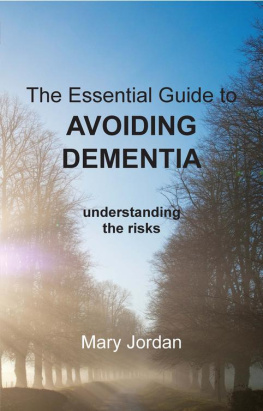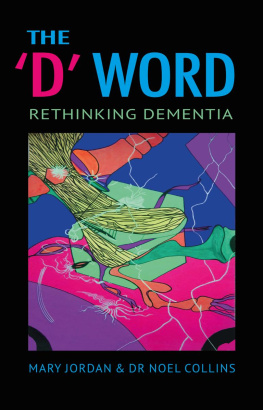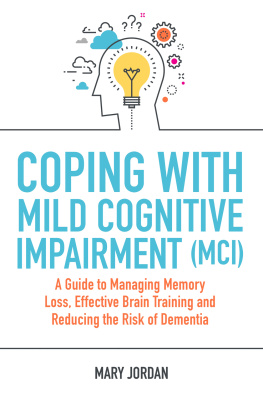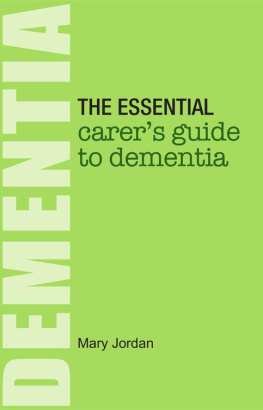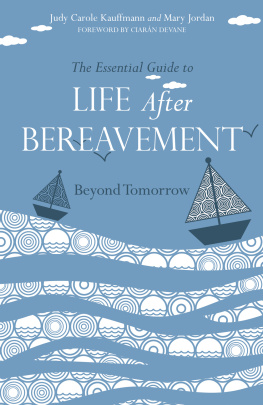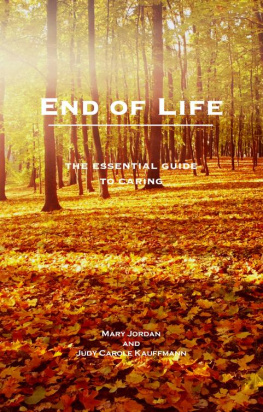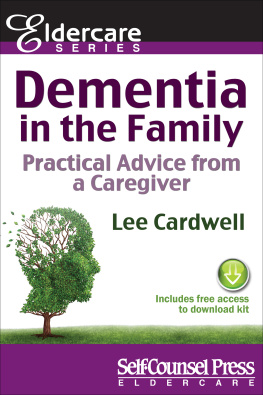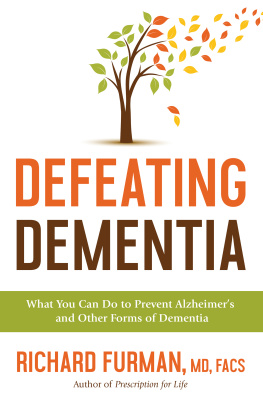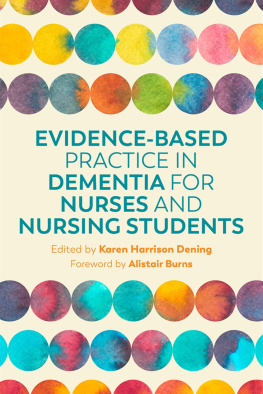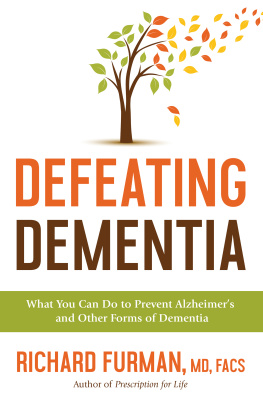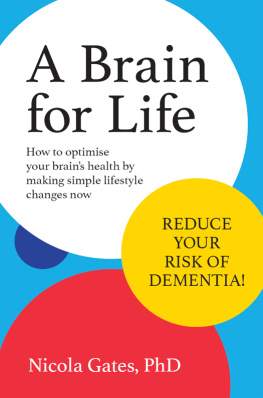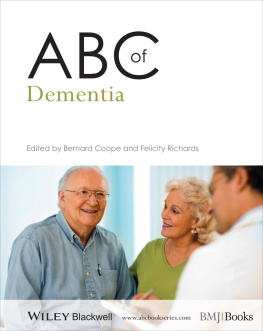No book is written without help and support from others. Essential Guide to Avoiding Dementia is no exception to that rule. I would particularly like to thank Dr Harry Boothby, MA, MB Bch, MRCPsych, who read, corrected and commented upon , Physical and mental illness.
Thanks are due to Janet Baylis and Andrew Holland, at the Alzheimer s Societys Dementia Knowledge Centre, who gave me an enormous amount of help to find various research papers, on occasion tracking down pieces of research with the minimum of information from me. The Dementia Knowledge Centre is open to anyone via the Alzheimers Society website and is a great resource for anyone interested in dementia research: www.alzheimers.org.uk/dementiacatalogue.
My friends and family have been very helpful in supplying and giving me permission to use the case history examples and I certainly could not have completed the book without their encouragement, the support of my two sons, Tristram and Rauf, and the many practical suggestions of my daughter-in-law, Erica Arnold.
I would also like to give special thanks to my editor, Georgina Bentliff, who has been a source of great technical support and endless patience.
What can we do to avoid getting dementia? Whenever I give a lecture or presentation on this disease, this is the question I am most often asked. Any doctor will tell you that to avoid getting a disease it is necessary to know the cause, but at the time of writing we do not know of a specific cause for dementia. Increasingly it is believed that, rather than there being a single cause, it is most likely that there are a number of factors which may predispose us to developing dementia. These are the risk factors; some of these we can modify and some we can take steps to avoid, if we know what they are.
Every day the media runs stories about a cure for Alzheimers disease , but on closer inspection most of these are revealed to be just stories perhaps with a tiny nugget of information about a new line of research. As I spend my days supporting those with dementia and their carers, it is this research that is of interest to me.
In addition, people like myself who work in the field of dementia-support are able to spend time, so often not available to other health professionals, on in-depth conversation with those whose lives have been affected. We find factors that come up again and again physical and mental trauma, illness, stress, nutritional habits and lifestyle options.
As I have studied the research and put together information about risk factors, I have begun to notice a number of what I call connections . Many others are interested in these connections too, and in the theories and viewpoints about some of the treatments which have empirical evidence behind them, as well as the hard evidence that comes from medical trials. I have written this book for those people and for anyone who is worried about the possibility of developing dementia.
This book is a review of some of the many areas of research into the risk factors. I discuss some of the conclusions of that research and also look at more tenuous connections which may nevertheless be of interest. I have included case histories where these illustrate important points in the book (these have come from family and friends who have kindly agreed to their inclusion) and I have added a glossary to explain some of the less familiar terms that recur in the book. (You will find these are in bold in the text.) I very much hope the book will stimulate debate and inspire readers to take a look at the original research to which I refer. Most of all, I hope the book will help and encourage anyone concerned with dodging the D word.
Mary Jordan writes that dementia is the diagnosis that everyone dreads and recent survey data support this view, that people in middle age and older worry about dementia more than any other condition, including cancer. And this fear coincides with, and is probably influenced by, an anticipated steep trajectory in the number of people living with dementia in the years to come. The outcome will be a doubling of the number in the United Kingdom by 2051, while globally the number will more than treble.
And what causes such extreme worry is that this degenerative and incurable politically correct disease cuts a swathe across society, never respecting power or privilege. Consequently, it is accompanied by a sense, if not a conviction, that nothing can be done to either prevent or reduce the risk of succumbing to a condition that not only results in profound intellectual disability but eventually in the loss of self and of awareness, which can mean that even if your world is supportive, safe and comforting it may be experienced as mysterious, threatening and a source of intolerable insecurity.
In the absence of any realistic hope of a cure, hundreds of thousands of baby-boomers are facing the spectre of advanced dementia. As a result Mary Jordans book is a timely must read. Embracing dementia awareness , health promotion and risk reduction, this thoughtful and well-written book may just help some avoid the devastating diagnosis of dementia.
Through chapters that are comprehensive, grounded in evidence but accessible to the interested, as well as specialists and practitioners in dementia care, the author explores the myriad of opinions, theories and viewpoints concerning the risks and causes of dementia, some of which surface in the media as sensational claims with only the smallest grain of truth behind them. But then the question is not so much why the media engage in such inaccurate sensationalism as why is it thought that people will be interested in such stories; it is because the fear of dementia is becoming ingrained in the psyche of people in high-income countries across the world.
Surveying the landscape to seek out vulnerability and the possibility of risk-reduction, Mary Jordan considers the potential contribution of physical and mental health, lifestyle, trauma, personality and nutrition, as well as the role of genetics. Her explanations are brought to life by brief case vignettes, while key learning points at the end of each chapter make clear the evidence and arguments.
Throughout, Mary Jordans message is that we must look at the research : because we do not yet know what triggers the cellular diseases that account for most dementias and so cannot truthfully be sure how to avoid developing, for example, Alzheimers disease, this book is an honest account of how we can lower the odds in the light of current medical knowledge and experience.

